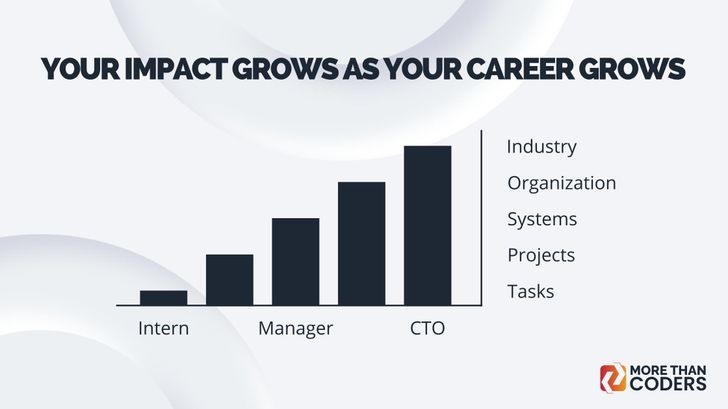How To Communicate With Executives as a Software Engineer
June 15, 2022

As a software engineer, you know communication with executives can seem like talking in a different language. It is critical to understand why communicating with leadership differs from your daily conversations, how to prepare for discussions with executives, and the top tips for communicating effectively with senior management.
With the right tools, you can feel confident when speaking with executives. You'll be able to explain your ideas and solutions in a way they will understand and appreciate. Continue reading to learn the skills you need to communicate effectively with executives today.
Why executive communication is different
While you may be focusing on the next story, feature, or project, the executive team is focusing on navigating the organization within the industry. The scope and perspective are completely different than that of individual contributors. That is not to say that software engineers don't have ideas and perspectives that can shape the organization or even the industry. We talk about focus and impact because it shapes how you should mold your message to senior leadership.

The executive team has a limited amount of items they can juggle at one time. They are often making dozens of decisions every week between back-to-back meetings. Executives can't focus on the minutia of the daily issues the organization is facing. They want to help us solve problems but don't have enough time and energy to give each situation significant time. It sounds harsh, but our job is to communicate why an issue is important to them.
This time and energy constriction can be a good thing for software engineers and managers who get an opportunity to interact with the senior leadership. A well-communicated plan can provide a software engineer with a positive experience in the eyes of the executive team, which can lead to increased opportunities to make an impact on the organization and industry, as well as raises or promotions. But, this opportunity to pitch your ideas to executives can only positively impact your career if you are prepared to communicate effectively.
How to prepare for conversations with senior leadership
It is critical to understand the correct way to approach problems and solutions to prepare for an upcoming presentation with senior leadership or to be ready if you are ever put on the spot to engage with the executive team. As discussed above, executives communicate differently and need information presented differently.
Understand the requirements
The most important tip we can provide is to ensure you understand your project's requirements before discussing them with the leadership team. Focus on what problem you are trying to solve and review your plan regularly to make sure your solution solves the outlined problem.
Making a list of the requirements can help you stay focused and keep your presentation flowing. When we get nervous, many people throw out everything they know about a subject. You want to be confident that you are providing the information the leadership team needs before you go into your presentation.
Frame your message
Once you outline your requirements, you can focus on framing your message for the audience. In this case, executives will want a clear purpose, result, or recommendation. To provide the purpose, you must be clear on why you are the person presenting. Once you outline why you are the best person to deliver the plan, you can trace back the result or recommendation to address the "why."
For example, if you are presenting a proposal to build a mobile app to a board, you should frame your message with your experience building mobile apps and a clear need for why a mobile app is the best solution. This "why" may be something as simple as offline functionality or a market share you are trying to capture. It should not be extensive but relatively high level. Remember, executives are experts within the industry but not necessarily experts within software.
Tips for communicating effectively with senior management
If you want to communicate effectively with senior management, here are some tips to ensure you are successful:
- Use charts and graphs to communicate large and complicated topics quickly.
- Keep your communication straightforward.
- Be direct to avoid ambiguity.
Let's dive into each topic individually.

Use charts and graphs
Using charts can be a helpful tool for explaining complex ideas quickly. Since you only have a limited amount of time to present your ideas, a chart can convey much more information than trying to explain the data.
Be careful when using data within your presentation. Executives review charts and graphs frequently and can identify misleading information. If the data doesn't support your point, you should not change or manipulate the information to look better.
Keep your communication simple
As software engineers, we are often called upon to present our work to senior leadership. When doing so, it is crucial to keep our communication simple and to the point. We should not try to dumb down our presentation for the executive team but rather provide a high-level overview of the most important topics. A 30,000-foot summary will allow them to dig into the details as necessary.
Be direct to avoid ambiguity
It is important to remember that when talking with an executive team, we must be direct and to the point. Reading from a script or slide deck is a surefire way to show that we are not prepared and lack conviction. Instead, we should use these materials to augment our conversation and back up our main points. By being clear and concise, we can effectively communicate with decision-makers and ensure that our technical work is given the consideration it deserves.
Successfully communicate to leadership as a software engineer
As a software engineer, you know communication with executives can seem like talking in a different language. You need to understand why communicating with leadership differs from your daily conversations, how to prepare for discussions with executives, and the top tips for communicating effectively with senior management.
But don't worry - we've got you covered! Take these tools and apply them regularly to feel confident when interacting with those in charge. Soon, communication will be a breeze, and you can focus on what matters - developing fantastic software that makes people's lives easier.




